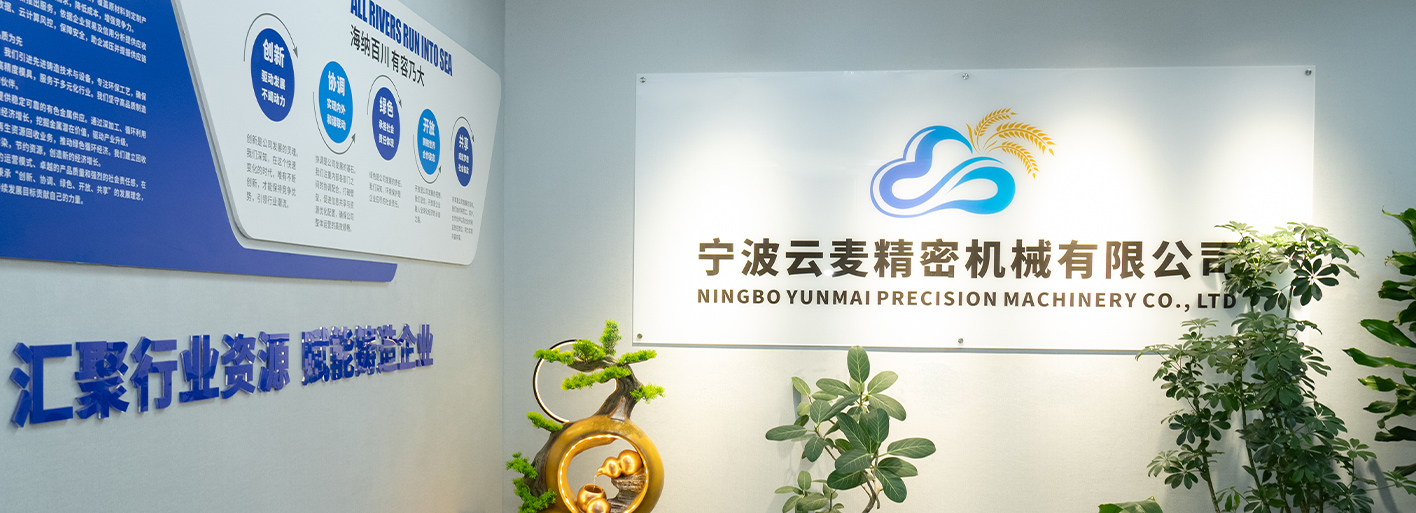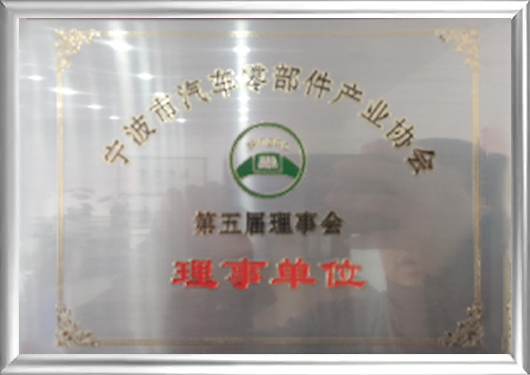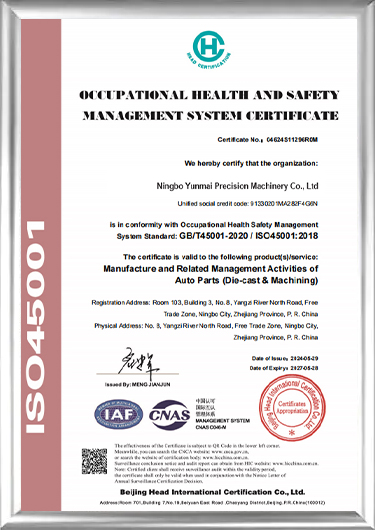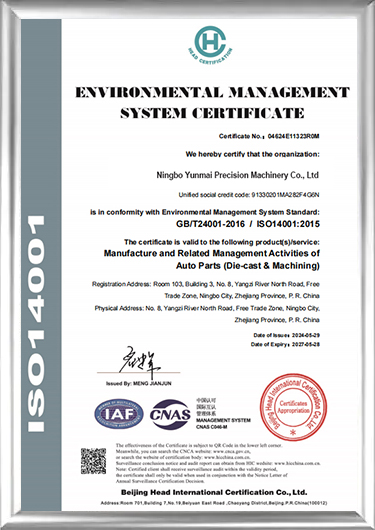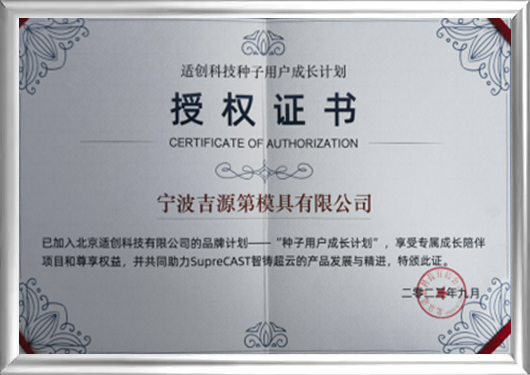Introduction to Other Die Castings
Die casting is a manufacturing process that has transformed how industries approach the production of metal components. The term
other die castings refers to the range of die-cast products beyond the common high-volume items such as automotive parts or basic structural components. This broader category includes a variety of more complex, specialized parts and systems that are crucial for many sectors, including electronics, telecommunications, industrial machinery, and more. The key to die casting’s versatility lies in the precision and efficiency with which it can produce intricate designs. By injecting molten metal into a mold under high pressure, manufacturers can create parts that are not only structurally sound but also have exceptional surface finishes and intricate details. One of the leading manufacturers in this industry, Ningbo Yunmai Precision Machinery Co., Ltd., has been at the forefront of producing high-quality aluminum die-castings. With its origins as the JYD Mould factory, established in 2012, Ningbo Yunmai has built a reputation for delivering excellent die-casting molds and finished parts to a wide array of industries, including some of the world’s leading companies in the automotive and communication sectors. Known for its high-end mold design capabilities, competitive pricing, and ability to deliver tailored solutions, Ningbo Yunmai has become a trusted name for companies like Tesla, BYD, Volkswagen, and Huawei.
The die-casting process begins with the preparation of the mold, which is typically made from hardened steel to withstand the intense pressures of molten metal injection. The mold consists of two halves that, once clamped together, form a cavity that will take the shape of the finished part. The key feature of die-casting is the use of high pressure to force the molten metal into the mold cavity, a process that ensures that even the most intricate features of the mold are perfectly captured. After the metal has been injected, the mold is cooled, and the component is ejected. The result is a highly detailed part with a smooth surface finish and dimensional accuracy that can often reduce the need for further finishing processes. This precision makes die casting an excellent choice for industries that require high-tolerance components, such as electronics and automotive manufacturing. For a company like Ningbo Yunmai Precision Machinery Co., Ltd., the ability to produce molds that are not only accurate but durable is a critical advantage. Their molds are renowned for their high precision, durability, and efficiency, qualities that are essential for meeting the stringent demands of high-volume production environments.
While aluminum is the most common material used in die casting, other metals can be used as well, each offering different benefits depending on the application. Aluminum die castings are favored for their lightweight, corrosion-resistant, and durable properties, making them ideal for industries like automotive manufacturing and telecommunications. Zinc and magnesium alloys are also commonly used in die casting for different purposes. Zinc, for example, is often used for small parts that require strength and corrosion resistance, while magnesium is valued for its light weight and strength, often used in the aerospace industry. Ningbo Yunmai Precision Machinery Co., Ltd. specializes in aluminum die casting, offering customers high-quality molds and die-cast products that meet rigorous performance standards. Their expertise in aluminum casting ensures that all products are lightweight, strong, and durable, making them suitable for high-performance applications like automotive parts, electrical components, and communication devices.
The applications of other die castings are wide-ranging, with these components playing a crucial role in industries that rely on precise, high-performance parts. For example, the automotive industry uses die-cast parts for engine components, transmission housings, and structural components, all of which need to withstand high levels of stress and temperature variations. In the electronics industry, die-cast parts are used in the production of casings for devices like smartphones, laptops, and home appliances, providing both protection and aesthetic appeal. Telecommunications companies, including giants like Huawei, rely on die-castings to create robust, durable components for their products, ensuring that their communication devices can withstand harsh environmental conditions. Ningbo Yunmai Precision Machinery Co., Ltd. has supported these industries by providing customized die-casting solutions that meet the high standards set by their global clients. With the company’s expertise in mold design and manufacturing, they are able to produce complex, lightweight parts that provide superior performance and durability.
Die casting offers several advantages that make it the preferred manufacturing process for many industries. One of the most significant benefits is the ability to produce parts with excellent dimensional accuracy. The high-pressure injection of molten metal into the mold ensures that every detail is captured, which leads to reduced scrap and less need for further machining. As a result, die casting can be a more cost-effective solution for high-precision parts compared to other methods, such as machining or injection molding. In addition to dimensional accuracy, die-cast parts also have a superior surface finish. The rapid cooling of the molten metal as it enters the mold leads to a smooth, polished surface that often requires little to no additional finishing. This is particularly important for parts used in consumer electronics and automotive applications, where aesthetics and performance are equally important. For companies like Ningbo Yunmai Precision Machinery Co., Ltd., these advantages are central to their success in the die-casting industry. With a strong focus on innovation and quality, they provide solutions that help their clients reduce costs and improve performance, all while meeting stringent requirements for precision and durability.
Mold design is a critical factor in the success of any die-casting project. A well-designed mold ensures that the metal flows evenly into all areas of the mold cavity, reducing the risk of defects such as air pockets, uneven wall thickness, or poor surface finish. The design of the mold affects the ease of part ejection and the overall cycle time of the die-casting process. Ningbo Yunmai Precision Machinery Co., Ltd. places a strong emphasis on mold design, ensuring that each mold is optimized for the specific requirements of the customer’s part. Their high-end mold design capabilities, coupled with advanced manufacturing processes, enable them to produce molds that are not only accurate but also durable enough to withstand the pressures of high-volume production. By providing custom mold design services, they are able to meet the unique needs of each client and help them achieve the best possible results.
In die casting, ensuring the quality of each part is essential. As the parts are produced under high pressure, any defects in the mold or the casting process can result in costly rework or part failure. For this reason, strict quality control procedures are implemented at every stage of the production process, from mold design through to the final inspection of the finished part. Ningbo Yunmai Precision Machinery Co., Ltd. employs a comprehensive quality control system to ensure that every product meets the highest standards. This includes conducting trial moldings, small-batch prototyping, and ongoing testing during mass production. By focusing on quality at every stage, the company ensures that its die-cast products consistently meet the needs of their clients, whether they are large automotive manufacturers or telecommunications companies.
